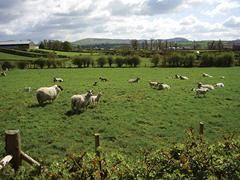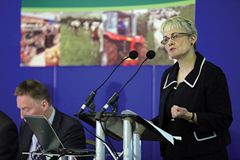Agri-food’s tale of two sectors
 While the agri-food industry is prospering, its continued growth will depend on providing sustainable returns to farmers. Richard Halleron reports on agendaNi’s agriculture and food seminar, where industry experts called for a strong focus on efficiency and cost-saving in the sector.
While the agri-food industry is prospering, its continued growth will depend on providing sustainable returns to farmers. Richard Halleron reports on agendaNi’s agriculture and food seminar, where industry experts called for a strong focus on efficiency and cost-saving in the sector.
Northern Ireland’s agri-food industry may have just broken through the £4 billion annual turnover barrier but, as delegates attending the recent agendaNi agriculture and food seminar found out, the growth within the industry as a whole has been very one-sided in nature. The year just ended will go down as one of the most challenging on record for Northern Ireland’s 30,000 farmers. Poor weather, rising input costs and challenging produce prices combined to significantly reduce farm incomes and deflate producer confidence. However, a return to more sustainable returns and better weather could turn all of this around in 2013.
A key theme identified by many of the conference speakers was the need for both the agri and food sectors to focus relentlessly on driving up efficiency levels while, at the same time, cutting costs. AFBI’s Professor Seamus Kennedy strongly argued the case for the local farming sectors to continually invest in research projects that will pay a dividend in terms of better animal and crop performance. He also highlighted the absolute necessity of keeping pandemic diseases, such as foot and mouth and bluetongue, at bay. AFBI (the Agri-Food and Biosciences Institute) is Northern Ireland’s first line of defence in this regard. Professor Kennedy went on to point out that his organisation is equally well placed to carry out research for the both the agri and food industries.
Back in December 2009, the then newly appointed EU Farm Commissioner Dacian Cioloş told the world that he wanted to push through CAP reforms that would be easier and much more straightforward to administer while, at the same time, reducing the red tape burden on farmers. However, three years almost to the day later DARD’s Seamus McErlean stood up at the agendaNi seminar and admitted that the current reform proposals, which had been published by the Commission in October 2011, are extremely complex in nature.
To his credit, however, he did a tremendous job in putting across the main themes contained therein, using very clear and concise language. Assuming that the current budget for agriculture can be maintained beyond 2015, it seems that local farmers will have to adapt to a flat rate, area based support system – which will be linked to new environmental, or ‘greening’, measures.
Vion’s Pork Director Seamus Carr told attending delegates that niche market opportunities are fast opening up for the pig processing sector in countries such as China. However, he stressed repeatedly that a single food business cannot control international market conditions; the only factors which any operator has influence over are those which arise within the environs of his or her own business.
United Dairy Farmers’ CEO David Dobbin told the conference that the milk sector will remain at the very heart of Northern Ireland’s agri-food industry with the focus very much placed on adding value. However, he also pointed out that the expansion of the EU’s dairy sector beyond 2015 could create competition challenges for the industry here at home. As a result it could be at least 2020 before the local dairy sector will feel the full benefit of the envisaged increase in global food demand, a direct consequence of the projected 50 per cent increase in the world’s population that is expected to become a reality over the next 30 years.
The seminar succeeded in highlighting many of the challenges now confronting Northern Ireland’s agri-food sectors. But one over-arching reality did become apparent, and it’s this: unless local farmers receive sustainable returns, the foundation on which the food processing sector is built will be quickly washed away.
 Ritchie pushes for realistic CAP deal
Ritchie pushes for realistic CAP deal
The SDLP’s Margaret Ritchie told delegates attending the agendaNi agri-food seminar that that everything must be done to deliver a CAP reform deal that best meets the specific needs of Northern Ireland’s farming sectors.
The South Down MP, who has been a member of the Environment, Food and Rural Affairs Committee (EFRA) Select Committee in the House of Commons since February last, added: “Local agriculture has a gross output of £4 billion and is one of our strongest-growing sectors. I want to see that continue.
“It is notable that, south of the border, the Irish Government has been quick to recognise the importance of the agri-food sector as a key driver in the national economy and have committed to growing that industry by 30-40 per cent before 2020. It is at the centre of their economic programme and it should be at the centre of ours.
“Key to that will be attaining a sound outcome from Common Agricultural Policy reforms in Europe. The total farm income in Northern Ireland in 2011 was £308 million, of which £267 million came from the single farm payment. The impact of the planned reforms will be felt throughout the agri-food industry.
“I will be putting the case to my EFRA colleagues that we should be arguing for an approach closer to that put forward by the Irish Environment Minister who is calling for an approximation model for CAP which would allow a gradual move towards a flat area-based payment but retaining bands above and below the national level. Central to all of this is an immediate resolution to the budget for the European Union.
“All of this is in sharp contrast to the UK Government who seem set on a reckless and sudden withdrawal from CAP altogether; they are playing politics with the livelihoods of thousands.”
Margaret Ritchie also pointed out that she will push to have the new ‘grocery adjudicator’ given real powers to ensure that farmers get a realistic proportion of the total food retail returns generated throughout the UK.
“The adjudicator must be given teeth, so as to ensure that the buying practices of the supermarkets can be fully revealed,” she concluded.
 Dobbin outlines Agri-Food Strategy Board thinking for milk sector
Dobbin outlines Agri-Food Strategy Board thinking for milk sector
Courtesy of his presentation to the agendaNi seminar, Agri-Food Strategy Board member David Dobbin indicated that their draft report to ministers, which will be submitted early this year, is based on further growth in the local dairy industry. The dairy sub-group, whose draft recommendations are still being considered, believes that the emphasis in dairy farming should be on growth in the total dairy solids being produced rather than the literage of milk.
The dairy sub-group has also looked at further growth in the processing sector and how the value added can be increased. In overall terms, the sub-group is seeking to maintain the current growth trajectory achieved over recent years which is circa 2 to 3 per cent per annum.
Significantly, the body’s final recommendations will also address three core issues which are having a major impact on every local dairy farm: fast rising input costs, market volatility and efficiency.
The United Dairy Farmers Chief Executive went on to point out that a major proportion of the increased output achieved by local milk producers over the past number of years had been ‘feed’ based.
“With feed costs rising to record high levels we must maximise our use of grassland which has slipped backwards over the last decade,” he added.
On the subject of market volatility, David Dobbin confirmed that the Agri-Food Strategy Board is looking at the feasibility of a price hedging mechanism or longer term contracts, which would serve to remove the extreme peaks and troughs that had so characterised farm gate returns over recent years.
“Such a system would allow local farmers and processors to better plan their businesses for the future,” he commented.
“More importantly, milk producers need margin stability not just price stability as they plan for the coming years and an effective hedging or contract system incorporating input costs such as feed and fertilizer could help deliver this for them.”
While remaining upbeat regarding the long-term prospects for the dairy sector in Northern Ireland, David Dobbin stressed that the ending of the EU milk quota regime and the potential that this development may have to encourage additional milk output in a number of EU member states had to be taken into account.
“There’s no doubt that the growth of the world’s population and the increasing requirement for high quality dairy protein in countries such as China will drive up international demand for dairy products,” he further explained.
“However, the ending of quotas in 2015 is likely to result in a surge in EU milk output not only in Ireland but also in other EU countries such as the Netherlands, Germany, Denmark, Italy and Poland. With the EU already in dairy surplus, all of the extra production would have to be exported, mainly in the form of powder which is why so many new drying plants are being built at present.
“Any surge in EU milk supply will have knock-on effects on the world market and most industry commentators are expecting market turbulence around 2014-2015. Once the EU post-quota surge in milk production is absorbed into the market, the milk industry here in Northern Ireland should start to see the full economic benefit of the growing demand for dairy products in countries around the world. However, the industry must prepare itself for the impact of quotas ending and be as efficient in farming and processing as possible.”
He concluded: “We must never lose sight of the tremendous natural advantages that farmers here in Northern Ireland enjoy when it comes to producing milk. Unlike the situation in many other countries, we have more than sufficient water and a good climate to grow grass.
“With modern grass varieties and the latest grassland management techniques, there is an opportunity to get more benefit from grass and forage. Feed will remain an important input so we need to ensure that we are at the leading edge of best practice in nutrition. We must build on these competitive advantages for the future.”
CAP reform: what’s on the agenda?
DARD’s Seamus McErlean told delegates attending the agendaNi agri-food seminar that a move to an area-based direct payment system for local farmers is inevitable beyond 2014. But, this aside, DARD (and Farm Minister Michelle O’Neill) will be pushing for as much regionalism and flexibility as possible when it comes to introducing the new measures on the ground here in Northern Ireland.
On the issue of defining an active farmer, DARD has introduced the possibility of using APHIS and its other databases to identify those people who were actively managing livestock or producing crops during the Commission’s proposed ‘activation’ year of 2011. By taking this approach, the issue of ‘actual farm income generated’ no longer becomes a contentious matter. The department is also keen to ensure that the new measures also recognise the legitimacy of those people who entered the farming industry post-2005.
Significantly, DARD will be pushing to ensure that that the transition to the envisaged area payment system must take place on a smooth or gradual basis. A strong hint has also been given that, even if a CAP deal is secured during the spring, it will take at least two years for the various regions of the EU to introduce all of the required enacting legislation. So, instead of 2014, it could be 2015 or possibly 2016 before the new CAP measures are actually introduced on the ground.
From a budgetary point of view, the Department of Agriculture and Rural Development is putting great emphasis on the fact that the UK should receive a significantly larger Pillar 2 budget next time around. This is the part of the CAP which facilitates the Rural Development Programme. Such an eventuality will rule out any future requirement to modulate Northern Ireland’s direct payments budget.
Farmers must target differential in pig quality: Vion
The Managing Director of Vion’s pork processing operation, Seamus Carr, has confirmed that the business is undergoing a major restructuring in order to future proof its long-term viability. His comments added to the expectation that the plant at Cookstown will remain a major player with the Irish pig processing sector, irrespective of whose name is above the front door.
Vion is based in the Netherlands. On 13 December, the company agreed a management buy-out of its UK pork operations which will be led by Seamus Carr and is backed by private equity firm Endless.
Seamus Carr went on to point out that his core objective will remain that of ensuring that the processing operations at Cookstown are as efficient as they possibly can be while, at the same time, improving supply chain efficiency.
“This means working with farmers to generate the most profitable pig for the complete supply chain. In achieving this, we will manage to narrow the £15 per pig gap of profitability that exists between the most and least profitable pig for the business,” he further explained.
“I can only focus on what I can influence. For example, I have no control over the world’s grain and protein markets. Naturally, I am fully aware of the tremendous input cost pressures that are impacting on every local pig business at the present time.
“And I remain fully committed to working with farmers so as to ensure that they are producing the right pigs for my business. If they are doing that, then they will receive the direct benefit of improved returns.
“Asking me what price I am paying for pigs this week or any other week is totally irrelevant in the grand scheme of things. The core challenge facing pig farmers is that of improving the quality of the pigs they are producing and their suitability for processing.”
On the issue of getting the best possible return for processed pigs, Seamus Carr went on to confirm that growing niche market opportunities in countries such as China now exist.
“We need to be targeting these markets as a matter of priority. If we don’t, our competitors in other parts of the world will.”





